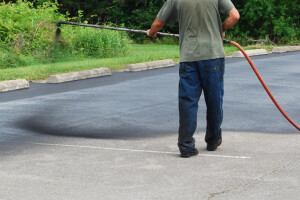Asphalt is a popular material for paving driveways, parking lots, and roads due to its durability and cost-effectiveness. However, to maintain its longevity and aesthetic appeal, asphalt requires regular maintenance. One of the most effective maintenance practices is asphalt sealcoating. In this blog, we will delve into what asphalt sealcoat is, the types of asphalt sealers available, and how to choose the best sealcoat for your needs.
What is Asphalt Sealcoating?
Asphalt sealcoating is a protective layer applied over the surface of asphalt pavements. This layer acts as a barrier against elements like water, oil, and UV rays, which can cause significant damage over time. Sealcoating not only enhances the appearance of the asphalt by giving it a fresh, black finish, but it also extends its life by preventing cracks and potholes.
Types of Asphalt Sealers
There are several types of asphalt sealers, each with unique properties and benefits. The most common types are:
- Coal Tar Sealers: Known for their durability and resistance to oil and chemical spills, coal tar sealers are popular for high-traffic areas. They provide a strong protective barrier but have a strong odor and can be more difficult to apply.
- Asphalt Emulsion Sealers: These sealers are made from asphalt itself, making them more environmentally friendly compared to coal tar. They are easier to apply and have a milder odor. However, they may not be as resistant to chemical spills.
- Acrylic Sealers: Acrylic sealers are synthetic and provide excellent UV protection and color retention. They are highly durable and suitable for residential driveways and decorative pavements. However, they typically cost more than other types of sealers.
- Fast-Dry Sealers: As the name suggests, these sealers dry quickly, making them ideal for areas that need to be reopened to traffic soon after application. They often include special additives to speed up the drying process.
Choosing the Best Asphalt Sealcoat
Selecting the best asphalt sealcoat for your needs depends on several factors:
- Traffic Load: Consider the amount and type of traffic the pavement will endure. For high-traffic areas like commercial parking lots, coal tar sealers may be the best due to their durability. For residential driveways, asphalt emulsion or acrylic sealers may suffice.
- Climate: The local climate plays a significant role in determining the appropriate sealcoat. In areas with harsh winters and frequent freeze-thaw cycles, a flexible sealer like asphalt emulsion might be better. In sunny, hot climates, UV-resistant sealers such as acrylic are advantageous.
- Chemical Exposure: If the pavement is exposed to chemicals and oil spills, a coal tar sealer’s superior chemical resistance might be necessary.
- Environmental Concerns: For those concerned about environmental impact, asphalt emulsion, and acrylic sealers are more environmentally friendly options compared to coal tar sealers.
- Budget: Budget constraints will also influence your choice. While acrylic sealers offer excellent protection, their higher cost may not be justifiable for all projects. Coal tar and asphalt emulsion sealers are generally more cost-effective.
Receive Asphalt Sealcoating Services with Tri-State Paving
Call Tri-State Paving. We’re a seasoned asphalt pavement company based in Maryland and have the experience and knowledge to help you turn your backyard into the perfect retreat quickly and affordably. Our experts will work with you to find a design and layout for the outdoor kitchen and dining area that you’re sure to love for years and years to come.
Our area numbers are:
West Chester: 610.563.9456
Oxford: 610.932.3566
Delaware: 302.757.4100
Check back here for weekly updates on current projects, important paving facts and info, and smart ideas for homeowners interested in concrete, asphalt, or hardscaping work.
Tags: asphalt care, asphalt maintenance, asphalt sealcoating

 ASPHALT
ASPHALT
 Commercial
Commercial
 Residential
Residential
 DOT
DOT
 Decorative
Decorative
 Sealcoating
Sealcoating
 Infrared Repairs
Infrared Repairs
 CONCRETE
CONCRETE
 Flat Work
Flat Work
 Decorative
Decorative
 Curbs/Gutters
Curbs/Gutters
 Steps
Steps
 Slab Jacking
Slab Jacking
 Pump Trucks / Pump Trailers
Pump Trucks / Pump Trailers
 HARDSCAPES
HARDSCAPES
 Walls / Borders / Curbs
Walls / Borders / Curbs
 Walks / Patios
Walks / Patios
 Aprons
Aprons
 Steps
Steps
 Columns / Fire Pits
Columns / Fire Pits
 Outdoor Kitchens
Outdoor Kitchens